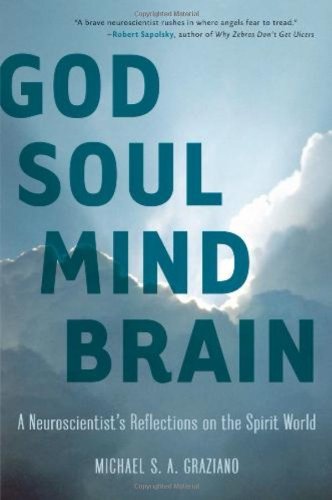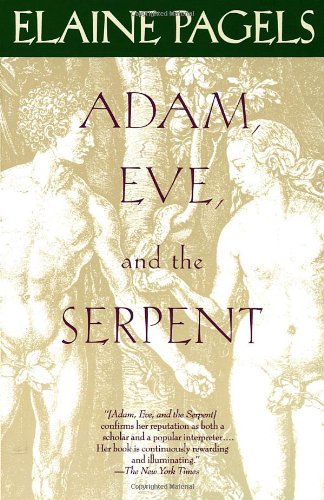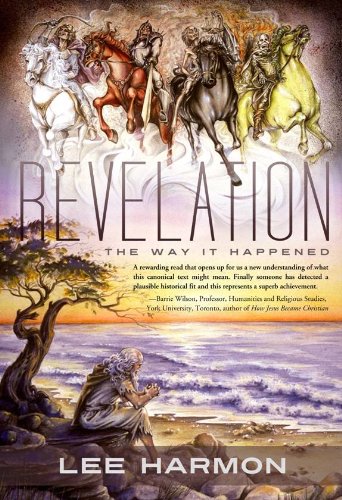Amos 4:6, Clean teeth
And I also have given you cleanness of teeth in all your cities … yet have ye not returned unto me, saith the LORD.
//Here’s an odd verse. God seems to be saying that he granted Israel snow-white choppers and still they didn’t turn to him.
As I admire the manicured smiles of American Idol contestants, I wonder how many of them give glory to God for their oral hygiene?
OK, enough toying with you. “Clean teeth” in Bible days is no gift. It means an empty stomach, and it’s God’s way of saying that as much bad fortune as he smote Israel with, they would not give in.
Got an opinion? 8 commentsBook review: God Soul Mind Brain
by Michael S. A. Graziano
★★★★★
Can a science book be also a feel-good book? This one is. Thank you, Graziano, for the lift.
Graziano brings to the table a professorship in social neuroscience, and builds atop the work of Dawkins and others in social memes, to explain what makes us human. He explains the workings of the brain to model the world around us, helping us interact socially and “feel” our way through life. Consciousness, the great mystery of our age, is merely “social perception applied inwardly.” It’s a process, not a thing. The book is short and very readable, but if you do find yourself struggling to grasp or appreciate the material, then skip over parts, but don’t put the book down before the final chapter.
Graziano is an atheist who thinks religion is complex and marvelous. That’s a good thing, because he also feels religion cannot be outgrown. He wants nothing to do with the aggressive new atheism which seeks to ridicule the religious into discarding dangerous beliefs for rational thinking. “I simply think that eradicating religion is not possible. It is a fallacy that ignores the specs of the human machine. We are not rational entities. Religion, like all culture, grows on the social machinery in our brains.”
God, it turns out, is the amygdala, though Graziano would never say this outright, and he’ll probably hunt me down for misrepresenting him. His own definition of God is “the perception of intentionality on a global scale. It is the perception of a single, unified mind behind every otherwise inexplicable event.” Don’t worry if this sounds like geek-speak, because the discussion of intentionality will make the definition clear and simple. In fact, everything in the book is clear and simple, enjoyable and unforgettable. Read it!

Genesis 1:1, What holds the earth up?
In the beginning God created the heaven and the earth.
//So begins our story of the creation in Genesis chapter 1. Picture a flat earth, unmoving, poking up out of the water. A bowl, or dome, covers and protects the entire earth, which separates the waters below from the waters above. Doors in the heavens (the top of the dome) allow water from above to come through as rain. If you would like to think of an enclosed dome-shaped snow globe, one of those Christmas scenes you shake upside down and then turn right side up to watch the snow fall, you’ll have the general idea.
The sun and the moon, the two great lights, track across the underside of this dome every day and night to provide light. At night, most people imagined the stars to be either gods or angels, while some pictured them as little holes in the dome for the gods to peek through. Below the waters is hell (Sheol), the realm of the dead.
But here’s the puzzle. What holds the whole thing up? The Bible actually provides several solutions to the puzzle:
Psalm 24:1, For he hath founded [the earth] upon the seas, and established it upon the floods. That’s all fine and well, but what keeps the earth from sinking into the sea, or at least floating away?
Psalm 104:5, Who laid the foundations of the earth, that it should not be removed for ever. Ah! So we have a foundation beneath us, keeping us stabilized. But it’s still not clear what keeps us on top of the water.
1 Samuel 2:8, The pillars of the earth are the LORD’S, and he hath set the world upon them. Here’s the answer. Pillars! Pillars run down from the earth, through the waters, to Sheol, where they hit bedrock. This was a common belief in antiquity, shared between several ancient Mediterranean civilizations, and the earth’s pillars are mentioned multiple times in the Bible. But not everybody believed this; Job has his own idea:
Job 26:7, [God] stretcheth out the north over the empty place, and hangeth the earth upon nothing.
Perhaps we’ll never know for sure how it all stays afloat.
Book review: Jesus Potter Harry Christ
by Derek Murphy
★★★★★
Was Harry Potter molded in the form of Jesus Christ? This book touches on the similarities between Jesus and Harry, but only as a surface introduction and running theme floating above a much deeper topic. The meat of the book is in its serious research into Jesus as a nonhistoric figure, a developed myth. Like our favorite little wizard.
This idea of a nonhistorical Jesus greatly disturbs most Christians. Murphy takes a stab at explaining our unease: “If Jesus was not historical, he would have been no different from other myths and fables … he would be meaningless, and it is impossible for him to be meaningless, because he is meaningful to me. Therefore he is historical.” He’s right, the idea of Christ as a myth is more than a bit disconcerting; it hits at the very heart of many of us.
Yet Murphy’s intent is not to demote Jesus to the role of an ordinary fictional being, or even an ordinary god. Jesus was never meant to be the same as other contemporary figures of mythology; to his storytellers, he was the epitome of such. “Jesus would be something entirely new simply by virtue of his being an assimilation of the best features of each. Jesus is the culmination and combination of all other religious traditions of his time.”
Murphy sifts through various mystery religions and myths of a dying and resurrecting god, and their possible influence upon the Gospel story. For once, it’s done tastefully and without sensationalism. Maybe you’ve read works by Freke, Dougherty, and Harpur. While I don’t want to take anything away from those researchers—their books are interesting in their own right—I found Murphy’s tempered treatment much more to my taste. Without trying to foist a Gnostic version of Christianity on me, and without succumbing to overzealous scholarship, Murphy gently yet forcefully introduces the strong similarities between Christianity and other first-century religious philosophies and mystery cults, concluding in the strong likelihood that Jesus was a mythical savior.
I cannot help but add my two cents. Part of Murphy’s argument seems to be that it’s unreasonable to expect first-century writers to knowingly attribute mythical qualities and stories to a historical person. Ergo, Jesus must have been understood mythically. I must confess that my area of research biases me in favor of a historical Jesus. I’m a hard sell, because for years I immersed myself in the topic of divine attributions awarded to real, historical persons in the Imperial Cult (the cult of the Caesars) and I recognize much of the New Testament as a response on the same playing field; Christians lifting up their guy in the same manner. I find nothing strange about honoring a man such as Jesus in supernatural story and find it a quite plausible explanation for the plethora of Jesus’ similarities to pagan gods and heroes.
Additionally, in order for Murphy to prove Jesus was never a real person, so much hinges on Paul, our earliest Christian writer, and Paul is an enigma. Murphy points out many interesting similarities between the teachings of Paul and the mystery religions, where the central rite, it appears, was a symbolic death of the initiate, followed by rebirth into a new life. Sounds a lot like Paul, doesn’t it? Murphy argues that Paul recognized Jesus’ crucifixion metaphorically, and expected his converts to experience the same death. Unquestionably, Gnostic strands of Christianity did worship Jesus in the form of a mystery religion, and such groups did embrace the writings of Paul. But would such an understanding of Jesus drive Paul to such great suffering and imprisonment? Would it leave him absolutely convinced that the world was ending—quite literally and quite rapidly—and that believers in Christ would be swept up to heaven? Remember, Paul was so convinced the end of the world drew near that he even encouraged abstinence, telling his readers that the time grew so short that they needn’t bother marrying.
So, even though it’s hard for me to fully embrace Murphy’s conclusion, I loved the book, and found it to be a fascinating and scholarly contribution to a very hot debate. It should be welcomed as such.

Jeremiah 13:23, Can a leopard change its spots?
Can the Ethiopian change his skin or the leopard its spots? Neither can you do good who are accustomed to doing evil.
//Can’t say I ever paid much attention to this verse before. An Ethiopian (Hebrew: Cushite) is a black-skinned person, probably from the upper Nile region. As many times as I’ve heard the popular saying about a leopard changing its spots, I’ve never heard anyone mention the first half of this verse, about whether a black person can change the color of his or her skin skin.
Neither can you do good who are accustomed to doing evil.
OK, I don’t really think the Bible is being racist, here. Elsewhere in the Bible, the Cushites are treated with respect; particularly, the lovely lady of Solomon’s affection in Song of Solomon. Still, I hope the first part of the cliché never catches on.
Got an opinion? 2 commentsBook review: Adam, Eve, and the Serpent
by Elaine Pagels
★★★★
Augustine, arguably Christianity’s greatest teacher, often stressed the sinful nature of sexual desire. Adam’s sin corrupted the whole of nature itself, and infants are infected from the moment of conception with the disease of original sin. When did this idea come about that sex is inherently sinful? When did the fall become the Fall?
In Genesis 1, God gifted the power of earthly rule to Adam. Yet, in the late fourth and fifth centuries, this message began to change. Adam’s prideful desire for self-government led to the fall—I mean, the Fall—of mankind, and ever since, humanity has been sick, helpless, irreparably damaged. Human beings are incapable of self rule, not in any genuinely good way.
Says Augustine, “even the nature of the semen from which we were to be propagated” is “shackled by the bond of death.” Every being conceived through semen is born contaminated with sin. Christ alone is born without this sin, this libido. Because of Adam’s disobedience, “the sexual desire of our disobedient members arose in those first human beings.” These members are rightly called pudenda [parts of shame] because they “excite themselves just as they like, in opposition to the mind which is their master, as if they were their own masters.”
Okay, perhaps I have overemphasized Augustine and his hangup about sex. There’s more to the book, and Pagels is a good writer who manages to turn even this dubious topic into a fascinating read.

1 Kings 10:14, The Love of Money
The weight of the gold that Solomon received yearly was 666 talents
//Since I write often about Revelation, I hear just about every possible interpretation of Revelation’s beastly number, 666. Here’s another one, taken straight from the Old Testament. This story of Solomon collecting 666 talents of gold annually is corroborated in the book of Chronicles.
What did Solomon do with all his money? He made thrones and goblets of gold, he accumulated chariots and horses, he imported apes and baboons. So great was Solomon’s love of money that he became known for his riches as much as his wisdom. Says the book of Kings, Solomon was greater in riches and wisdom than all the other kings of the earth. The whole world sought audience with Solomon to hear the wisdom God had put in his heart.
Revelation, however, turns this accomplishment on its head. 666 becomes evil. Says Revelation, echoing the story of Solomon, All inhabitants of the earth will worship the beast. And who is the beast? As Solomon was the King of Taxation three thousand years ago, today’s King of Taxation is … whichever president is currently asking for our money, of course.
Know any other 666 tales? Share them with me!
Got an opinion? 0 commentsBook review: Revelation, The Way it Happened
I enjoy reading the reviews of my book … sometimes. Overall, the average review is quite positive, so I’m pleased. But to label the book “controversial” turns out to be an understatement. Perhaps that’s par for the course for any edgy religion title? Here are a few contradictory snippets that made me think differently about my own book. (None of these reviews are by anyone I’ve ever met.)
I think Christians reading Harmon’s work will either find their faith shaken, or feel the need to utterly deny his findings, however sound they may be. Once you begin to realize when these biblical books were written, by who, and using what source material, you can have little choice than to either discount it out of hand or seriously reevaluate the ground on which your faith currently stands.
–Sandra Novotny, thewitchescupboard.com
If you are a Christian who loves the Bible, wouldn’t you want to know how the words of the New Testament books were heard by the ears of their earliest listeners, for whom they were written? That is the purpose for which Lee Harmon wrote his book Revelation: The Way it Happened. In my opinion Mr. Harmon succeeds in reaching this goal. He is historically accurate and true to his faith.
–Rabbi Stephen M. Wylen, author of The Jews in the Time of Jesus
I doubt anyone can be convinced against their religious beliefs, so I have to side with Rabbi Wylen on this one. Some found my book unoriginal, others cutting edge:
A rewarding read and it opens up for us a new understanding of what this canonical text might mean. Finally someone has detected a plausible historical fit and this represents a superb achievement.
–Barrie Wilson, Professor, Humanities and Religious Studies, York University, Toronto, author of How Jesus Became Christian
This is a recognized interpretation called Preterism.
–Ruth Meyers, Librarything reviewer
Had Ruth read beyond page ten, she would have known better than to label it Preterism. Preterists will be quick to disown any historical-critical interpretation, especially mine…though, hopefully, not without first learning some interesting first-century facts to help bolster their own beliefs. But disagreements cropped up in more than just interpretation. The layout of the book is unconventional, splicing together fiction, scripture, and historical narrative, which left some feeling discombobulated and others invigorated.
In order to distinguish between inspired scripture, the author interpretations and explanations, and the fictional story, Harmon uses different fonts and spacing for each. This allowed for great ease in reading and thought transition.
–Vicki Landes, author of Europe for the Senses – A Photographic Journal
It’s an excellent way of explaining the complexity of Revelation, and I believe that it works very well.
–Frank J. Konopka, top 500 reviewer on Amazon
The effect of this attempt at synthesizing fiction with historical and textual research is one of confusion rather than clarity.
–T Polyphilus, Librarything reviewer and author
One reviewer wrote and said she could not give the book a decent review, as it met her qualifications for neither fiction nor nonfiction. Ruth Meyers, above (the one who read only ten pages), called it “completely incoherent.” Another said she read the book twice; once through for the fiction, then again for the nonfiction. Perhaps that’s the trick.
In the end, many readers will continue to believe about Revelation what they wish to believe. That’s how religion works, right?
I don’t necessarily agree with many of his findings and opinions, but I can appreciate the amount of work that went into developing them.
–Jason Lautzeneiser, Amazon reviewer
The historical context is unquestionably true and described in thorough detail.
–Logan, goodreads.com reviewer and author
So, whether you loved or hated the book, I’d be curious to hear what you think.
–Lee Harmon, author, Revelation: The Way it Happened

1 Chronicles 28:2-3, The First Temple
King David rose to his feet and said: “Listen to me, my brothers and my people. I had it in my heart to build a house as a place of rest for the ark of the covenant of the LORD, for the footstool of our God, and I made plans to build it. But God said to me, ‘You are not to build a house for my Name, because you are a warrior and have shed blood.’
//So, Solomon, David’s son, built the House of God. The first temple. Right? What, then, are we to make of the story of Hannah? The LORD had closed her womb, and she was growing discouraged about having a child. Hannah’s rival, the other wife of her husband, provoked her.
1 Samuel 1:7 This went on year after year. Whenever Hannah went up to the house of the LORD, her rival provoked her till she wept and would not eat.
Hannah’s husband tried to comfort her, but she remained so distraught that she could not eat.
1 Samuel 1:9, Once when they had finished eating and drinking in Shiloh, Hannah stood up. Now Eli the priest was sitting on a chair by the doorpost of the LORD’s temple.
Eli and his two sons were priests at Shiloh, tending the temple, which we now see is the “house of the LORD” from the first verse. Here, Hannah prayed for a son and God granted her a son named Samuel.
1 Samuel 1:24, After he was weaned, she took the boy with her, young as he was, along with a three-year-old bull, an ephah of flour and a skin of wine, and brought him to the house of the LORD at Shiloh.
As the story goes, Samuel ministers to God under Eli, the priest. Then begins the story of Samuel’s awakening:
1 Samuel 3:2-3, One night Eli, whose eyes were becoming so weak that he could barely see, was lying down in his usual place. The lamp of God had not yet gone out, and Samuel was lying down in the temple of the LORD, where the ark of God was.
Sorry about pounding my point into the table. I’m just pointing out multiple times over that there was indeed a temple, a House of God, in the days of Eli, 150 or more years before Solomon ever became king. This temple was in Shiloh, not Jerusalem. Where did this original temple come from? It dates, perhaps, way back to about the year 1400 BC:
Judges 18:31 to 19:1, They continued to use the idols Micah had made, all the time the house of God was in Shiloh. In those days Israel had no king.
David’s idea of a dwelling place for God was hardly original. He simply wanted that place to be in Jerusalem, not in Shiloh.
Book review: How Jesus Became Christian
by Barrie Wilson, Ph.D.
★★★★★
This is a long overdue review of a great new book. Wilson highlights the tension of Christianity’s founding movement, and asks the question: Was Jesus a Jew or a Christian? Paul’s brand of Christianity, especially, Wilson finds anti-Semitic, in stark contrast to the Gospel of Matthew and its reliance upon Torah. Paul, Wilson theorizes, hijacked Jesus for himself, turning Christianity into a Gentile religion.
Wilson’s portrayal of conflicting religions—the “Jesus movement” of the Jews, and the “Christ movement” of Paul—makes for fascinating reading. Paul experienced a mystical vision of the Christ, and everything he teaches flows from that deep, spiritual, ongoing connection between Christ and Paul. What used to be so simple became a complex theology, Paul’s message that all could be saved in Christ resounding throughout the Roman world.
Wilson discusses the book of Acts and its “revisionist history,” entwining Paul’s world with the Jesus movement as if they are one and the same, and concludes that there is simply no corroborating evidence for the Acts version. Instead, Paul’s letters betray an entirely different atmosphere. The Book of Acts invented history, and the version of Christianity we know today is better labeled “Paulinity.” The Jesus movement slowly faded away. In effect, the Jesus Cover-Up Thesis contends that early Christianity effectively killed off the historical Jesus. In the epilogue, Wilson encourages recovering the human Jesus and rediscovering his Jewish roots.
A thought-provoking and well-written book, definitely worth reading.

















 354 Circles
354 Circles
 603 Goodreads Friends & Fans
603 Goodreads Friends & Fans

 Hello! I'm an author, historical Jesus scholar, book reviewer, and liberal Christian, which means I appreciate and attempt to exercise the humanitarian teachings of Jesus without getting hung up on any particular supernatural or religious beliefs.
The Bible is a magnificent book that has inspired and spiritually fed generations for thousands of years, and each new century seems to bring a deeper understanding of life’s purpose. This is true of not only Christianity; through the years, our age-old religions are slowly transforming from superstitious rituals into humanitarian philosophies. In short, we are growing up, and I am thrilled to be riding the wave.
I avidly read all thought-provoking religion titles. New authors: I'd love to read and review your book!
Hello! I'm an author, historical Jesus scholar, book reviewer, and liberal Christian, which means I appreciate and attempt to exercise the humanitarian teachings of Jesus without getting hung up on any particular supernatural or religious beliefs.
The Bible is a magnificent book that has inspired and spiritually fed generations for thousands of years, and each new century seems to bring a deeper understanding of life’s purpose. This is true of not only Christianity; through the years, our age-old religions are slowly transforming from superstitious rituals into humanitarian philosophies. In short, we are growing up, and I am thrilled to be riding the wave.
I avidly read all thought-provoking religion titles. New authors: I'd love to read and review your book!
 Hi! While Lee writes the articles and reviews the books, I edit, organize, and maintain the blog. The views expressed here are Lee's but I'm his biggest supporter! :-)
Hi! While Lee writes the articles and reviews the books, I edit, organize, and maintain the blog. The views expressed here are Lee's but I'm his biggest supporter! :-)
Connect With Me!